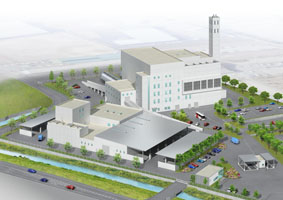Kawasaki to Build and Operate Japan's First Waste Treatment and Biogas Generation Complex
Jul. 01, 2010

Tokyo, July 1 — Kawasaki Plant Systems, Ltd. (K Plant) announced today that it has been awarded a contract from the city of Hofu, Yamaguchi Prefecture for a project to build and operate its Clean Center following approval of the city council. The design-build-operate project planned by the city includes the construction of a waste treatment facility and its operation over a 20-year period. The facility to be built under the project will be Japan’s first waste treatment complex combining sorting, biogas generation, and waste incineration facilities designed for highly efficient power generation. The sorting facility will separate out organic waste appropriate for biogas generation, which will then be converted to biogas via a dry thermophilic methane fermentation process in the biogas generation facility. Unused refuse and methane fermentation residue will be incinerated at a high temperature and low -oxygen density in a parallel flow incinerator with a mechanical stoker for efficient energy recovery. The waste treatment complex will also be equipped with recycling and sludge-to-biogas facilities. The recycling facility will collect recyclable materials from oversized, non-burnable, and recyclable waste while the sludge facility will turn sewage sludge and human waste discharged from adjacent facilities into biogas. Ash from the refuse incinerator will be used along with fly ash in cement production. The waste treatment complex leverages the full power of Kawasaki’s advanced waste treatment technologies for superior environmental and energy-saving performance. Delivering a maximum power generation capacity of 3,600 kW, the facility boasts an electric generation efficiency of 23.5% at normal waste treatment operation. This high efficiency rate all adds up to reduced maintenance costs and fewer greenhouse gas emissions, generating enough electricity to run the entire complex with a surplus that can be sold to the local power grid. Kawasaki is well known for its excellent biomass project track record. The long list of projects includes a biomass methane fermentation facility delivered to the Suzu City Sewage Treatment Plant in Ishikawa Prefecture under a joint project promoted by Japan’s Ministry of Land, Infrastructure and Transport and the Ministry of the Environment. Another recent outstanding example is the Conch Kawasaki Kiln (CKK) system developed jointly with Chinese cement manufacturer, Conch Cement. The innovative system effectively utilizes waste heat and ash from refuse incinerators to produce cement. This latest contract is a testament to Kawasaki’s extensive technological capabilities in the area of biomass power generation as well as its 40 years of experience in constructing and operating a wide array of waste treatment facilities. Continually moving forward to develop and market cutting-edge technologies, Kawasaki is enabling its customers to effectively use renewable energy sources. Kawasaki is successfully harnessing the power of the sun, wind and biomass resources to reduce our carbon footprint and build a sustainable foundation for a brighter future. |





